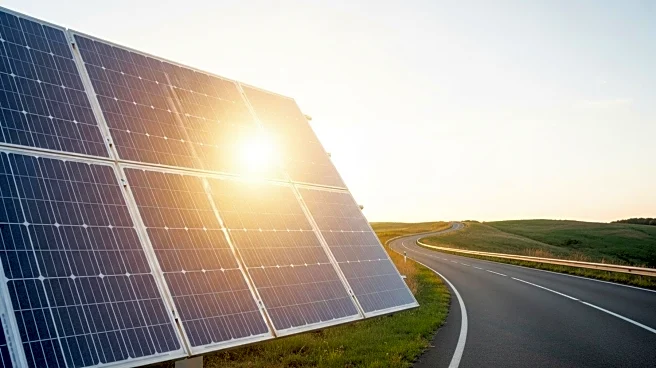What's Happening?
The solar industry in the United States is grappling with significant trust issues, primarily due to the complexities and costs associated with solar financing. According to a CleanTechnica article, the structure of solar-specific loans, often facilitated by large financial technology firms in partnership with solar installers, poses consumer risks. These risks include hidden fees, misleading statements about federal tax credits, and misrepresentations regarding voluntary prepayments. The Consumer Finance Protection Bureau has highlighted these issues, noting that the financing model heavily favors affluent households, thereby exacerbating income and wealth inequality. Additionally, the solar industry is criticized for exaggerated cost savings claims, which further erode consumer trust. The article emphasizes the need for federal and state regulators to ensure fair and transparent financing practices in the solar energy sector.
Why It's Important?
The challenges faced by the solar industry have broader implications for clean energy adoption in the United States. The current financing model, which disproportionately benefits wealthier households, undermines efforts to make solar energy accessible to the middle class. This could slow down the transition to renewable energy sources, which is crucial for reducing carbon emissions and combating climate change. Moreover, the trustworthiness gap in the solar industry may deter potential consumers from investing in solar installations, thereby affecting the industry's growth and the country's renewable energy targets. Ensuring transparency and fairness in solar financing is essential to build consumer confidence and promote widespread adoption of solar technology.
What's Next?
To address these issues, federal and state regulators, along with law enforcement agencies, are expected to scrutinize the financing practices within the solar industry. This could lead to new regulations aimed at ensuring transparency and competitiveness in solar financing. Additionally, there may be increased efforts to educate consumers about the risks associated with solar loans and the importance of understanding utility bills. The industry might also see a shift towards more affordable battery storage solutions, which could mitigate some of the costs associated with solar installations. As the U.S. Energy Administration projects continued growth in renewable capacity, particularly solar, these changes could play a pivotal role in shaping the future of clean energy in the country.
Beyond the Headlines
The solar industry's trustworthiness gap highlights deeper issues related to economic inequality and consumer protection. The current financing model not only favors affluent households but also raises ethical concerns about the accessibility of clean energy solutions for all socioeconomic groups. This situation underscores the need for a more equitable approach to energy policy that prioritizes inclusivity and fairness. Additionally, the industry's reliance on misleading marketing practices calls for a cultural shift towards greater transparency and accountability. As the demand for renewable energy grows, addressing these ethical and cultural dimensions will be crucial for fostering a sustainable and equitable energy future.










